WHEELS OF INDUSTRY.
Page 4
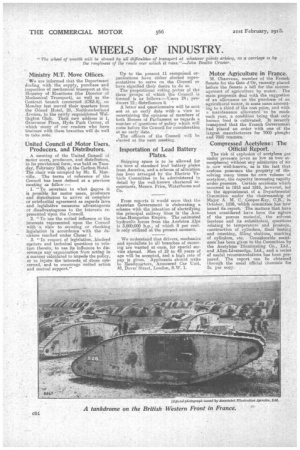
Page 5
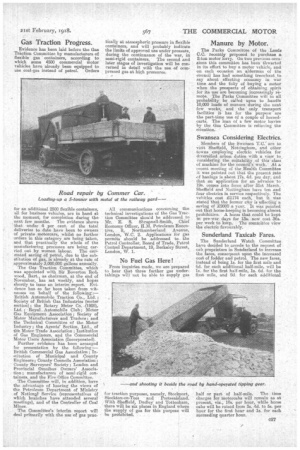
Page 6
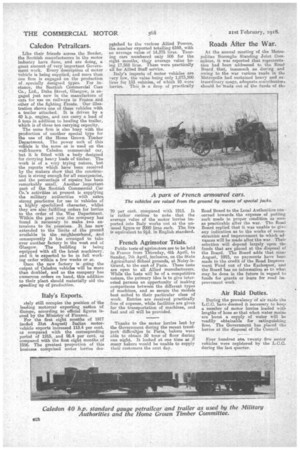
Page 7
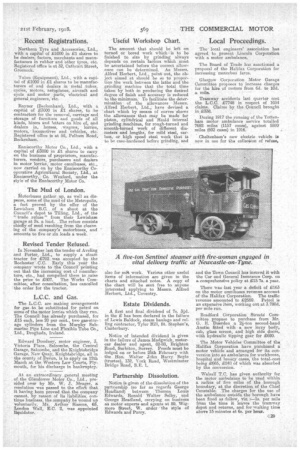
Page 8
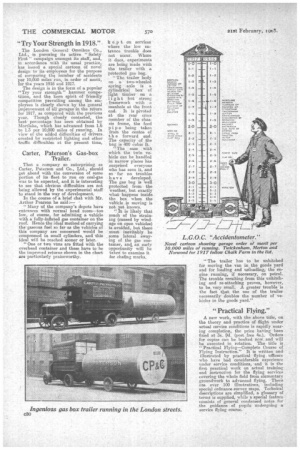
If you've noticed an error in this article please click here to report it so we can fix it.
The wheel of wealth will be slowed by all diOlculties of transport at whatever paints arising, as a carriage is by . the roughness of the roads over which it runs."—John Beattie Crozier,
Ministry M.T. Move Offices.
We are informed that the Department dealing with the supply, purchase and inspection of mechanical transport at the Ministry of Munitions (the Director of Mechanical Transport), as well as the Contract branch concerned (CE3.5); on Monday last moved their quarters from the Grand Hotel, 28, Northumberland Avenue, to the newly requisitioned Wellington Club. Their new address is 1, Grosvenor Place, Hyde Park Corner, of which many of our readers who have business with these branches will do well to take note.
United Council of Motor Users, ' Producers, and Distributors.
A meeting of the United Council ofmotor users, producers, and distributors, in its provisional form, was held on Tuesday, February 12th, at the Carlton Hotel. The chair was occupied by Mr. E. Manville. The terms of reference of the Council has been defined at a previous meeting as follow :— • 1. "To ascertain to what flegree it is possible for motor users, producers and distributors to arrive at complete Or substantial agreement as regards laws and legislative measures advantageous or disadvantageous to the interests represented upon the Council.
2. "To use the united influence or the interests represented upon the Council with a view to securing or checking legislation in accordance with the decisions reached under Clause 1.
3. "In respect of legislation;_kindredmatters and technical questions in relation thereto, to use, its influence to die
courage any organization from acting in manner calculated to impede the policy, or to injure. the 'interests., of -those con-" cerned, and to encourage united action and mutual support."
Up to the present 11 recognized organizations have either elected representatives to serve on the Couneil or have signified their desire to do so. The proportional voting power of the three groups of which the Council is formed Is as follows:—Users 24; producers 12; distributors S. '
A letter and questionnaire will be sent out at, an early date with a view to ascertaining the opinions of members of both Houses of Parliament as regards a number of questions of policy whieh will come before the Council far consideration at an early date.
The officers of the Council will be elected at the next meeting.
Importation of Lead Battery Plates.
Shipping space is to be allowed for six tons of standard lead battery plates from America, and a scheme of allocation has been arranged by the Electric -Vehicle Committee to be administered in detail by the well-known chartered ac-countants, Messrs. Price, Waterhouse and Co.
From reports it would seem that the 'Austrian Government is elaborating a scheme with the intention of electrifying the principal railway lines in the Austrian-Hungarian Empire. The estimated hydraulic forces from the Austrian Alps is 3,000;000 lep., of which 8 per cent. is only utilized at the present moment.
We understand that drivers, mechanics and specialists in all branches of motoring are wanted atones, for special service abroad. Men of .19 to 42 years of age will be accepted, and a high rate of pay is given. Applicants should write to Headquarters, Armoured Car Unit, 48, Dover Street, London, S.W. 1.
Motor Agriculture in France.
M. Chauveau member of the Freneh Senate for the dote d'Or, recently placed before the Senate a bill for the encouragement of agriculture by motor. The main proposals deal with the suggestion of an allowance on the purchase of an agricultural motor, in some cases 'amounting to a third of the cost price, and with a maintenance allowance to be made 'each year, a condition being that only human food is cultivated. It recently transpired that the French Government had placed an order with one Of the largest manufacturers for 7000 ploughs and 7000 tractors.
Compressed Acetylene: The Official Report
The risk of explosion of acetylene gas under pressure (even as low as two atmospheres) without any admixture of air is now well-known, as is the fact that acetone possesses the property of dissolving many times its own volume of acetylene, the capacity increasing rapidly under pressure. Certain accidents which occurred in 1915 and 1916, however, led to the appointment of a, Departmental Committee under the chairmanship of Major .A. M. C. Cooper-Ke_y, C..33.; in October, 1916, 'which committee has nave issued its.report. The matters that have been considered have been the nature of the porous material, the solvent (acetone and its substitutes), questions relating to temperature and pressure, construction of cylinders, their testing and retesting; filling stations, marking of cylinders, etc. • Considerable assistance has been given to the Committee by the Acetylene Illuminating Co., Ltd., and Allen-Liversedge, Ltd., and a series of useful recommendations haa been prePared. The report can be obtained, through the usual official channels for 2s. per copy.
Gas Traction Progress.
Evidence has been laid before the Gas Traction Committee by manufacturers of flexible gas containers, according to which some 4500 commercial motor vehicles have already been equipped to use coal-gas instead of petrol. Orders for an additional 2500 flexible containers, all for business vehicles, are in hand at the moment, for completion during the next few months. Tire evidence shows that under 4 per cent, of the total deliveries to date have been to owners of private motorcars, whilst no further orders in this category are being taken, and that practically the whole of the manufacturing processes are being carried out by woman labour. The mated saving of petrol, due to the substitution of gas, is already at the rate of approximately 3,000,640 gallons anntially.
The Gas Traction Committee, which was appointed with Sir Boverton.Red;. wood, Bart., as chairman, at the end of November, has sat weekly, and hopes shortly to issue an interim report. Evidence has so far been taken from witnesses on behalf of the folloicing:— British Automobile Traction CO., Ltd. ; Society of British Gas Industries (meter section) • the Rotary Meter Co. :0_905), Ltd. ; Royal. Automobile club; Motor Gas Equipment Association; Society of Motor Manufacturers and iraders; and the Technical Committee of the Motor Industry; the Agents' Section, Ltd., of the Motor Trade Association ; Institution of Gas Engineers, and the Commercial Motor -Users Association (Incorporated).
• Further evidence has been arranged for presentation by the following:— British Commercial Gas Association; Institution of Municipal and County Engineers; County Councils Association; County Surveyors' Society; Landon and Provincial Omnibus Owners' Association ; manufacturers of semi-rigid eon. tainere, and the Fire Office Committee.
The Committee will, in addition, have the advantage of hearing the views of the Petroleum Department of Ministry of National Service (representatives of which branches have attended several meetings), and of the Controller of Coal Mines.
The Committee's interim report will deal priinarlly with the use of gas prat
tically at atmospheric pressure in flexible containers, and will probably indicate the limits of approved use under pressure, during the continuance of the war, in semi-rigid containers. The second and later stages oi investigation will be concerned in detail with the use of sorepressed gas at high pressures.
All communications concerning the technical investigations of the Gas Traction Committee should be addressed to Mr. E. S. Shrapnell-Smith, Chief Economy Officer, H.M. Petroleum Executive, 8, Northumberland Avenue, London, W.C. 2. Applications for gas permits should be addressed to. the Petrol Controller, Board of Trade, Petrol Cantrol Department, 19, Berkeley Street,. London, W. 1.
No Fuel Gas Here!
Erorn inquiries made, we are prepared to hear that three further gas under, takings will not be able to supply gas for traction pirposes, namely, Stockport, Stockton-on-Tees and Portseaisland. With Sheffield, Dudley' and Tottenham, there will bessix places in England where the supply of gas for this purpose will he prohibited.
Manure by Motor.
The Parks Committee of the Leeds C.C. recently proposed to purchase 2-ton motor lorry. On two previous occasions this committee has been thwarted in its effort to buy a motor vehicle, and on each occasion an alderman of the council has had something trenchant to say about effecting economy in war time and the folly of buying a motor when the prospects of obtaining spirit for its use are becoming increasingly remote. The Parks Committee Will in all probability be called upon to handle 10,000 loads of manure during the next few weeks, and the only transport facilities it has for the purpuze are the part-time use of a couple of horsedcarts. The loan of a few motor lorries by the Gas Committee is relieving the aqua tion.
Swansea Considering Electrics.
Members of the Swansea T.C. are to visit Sheffield, Nottingham, and other towns employing electric vehicles. for diversified . urban duties with a view to considering the suita.bilitvof this 'class of machine for the Council's' work.At a recent meeting of the Health Committee it was pointed out that the present rate of haulage is abbot 17s. 4d. per day, and that an application for an advance' to 19s. -comes into force after 31st March. Sheffield and Nottingham have ten and four electrics in service respectivelyThe
vehicles cost £1174 each, but it. Was . . stated that the former city is effecting a
saving of 2000 a year. It waS-pointed out that horse-keeping is becoming almost prohibitive.' A horse that could be kept so pre-war days for 135. now cost 36s. per week to keep. The committee view the electric favourably.
Sunderland Taxicab Fares.
The Sunderland Watch Committee have decided to accede to the request of cab proprietors in Sunderland to increase the fares, consequent upon the increased cost of fodder and petrol. The new fares, instead of being is. for the first mile and §d. for, each additional half-mile, will be 1s. for the first half-mile, is. 6d. for the first mile, and Od, for each additional half or part of half-mile. The time
charges for moths-cabs will remain as at present, viz., 10s per hour, while horse cabs will be raised from 3s. 4d. to 5s. per hour for the first hour and is. for each succeeding quarter hour.
Caled'on Petraikars.
Like their friends across the Border, the Scottish manufacturers in the motor industry have done, and are doing, a great amount of very important Government work. Every description of motor vehicle is being supplied, and more than one firm is engaged on the production of specially designed types. For instance, the Scottish Commercial Cars Co., Ltd., Duke Street, Glasgow, is engaged just now in the manufacture of ears for use on railways in France and other of the fighting Fronts. Our illustration shows one of these vehicles with a trailer attached. It is driven by a 40 h.p. engine, and can -carry a load of 5 tons in addition to hauling the trailer, which is of three ton carrying capacity.
The same firm is also busy with the production of another special type for the use of the Home Grown Timber Department. The power unit of this vehicle is the same as is used on the well-known Caledon commercial ear, but it is fitted with a body designed for carrying heavy loads of timber. The work is of a very trying nature, but the reports which have been received by the makers 8how that the construction is strong enough for all emergencies, and the percentage of repairs has been remarkably small. Another important part of the Scottish Commercial Car Co.'s activities at present is supplying the military authorities with extra strong earboxes for use in vehicles of
high_y specialized character, whilst they are also fulfilling orders for lorries to the order of the War Department. Within the past year the company has found it necessary to make two extensions to its premises. It has now ' extended to the limits of the ground available in the neighbourhood, and consequently it has arranged to take over another factory in the west end of Glasgow. The building is being equipped with all the latest machinery, and it is expected to be in full working order within a few weeks or so. Once the new factory is going the output of Caledon vehicles will be more than doubled, and as the company has numerous orders on hand, this addition to their plant should materially aid the speeding up of production.
Italy's Exports.
Italy still occupies the position of the leading motorcar exporting nation 'of Europe, accord* to official figures issued by the Ministry of Finance.
For the first eight months of 1917 (ended 31st August) Italian motorvehicle exports increased 113.4 per cent. as compared with the corresponding period of 1915, and 96.4 per cent, as compared with the first eight months of 1916. The greatest proportion of this business comprised motor lorries des
patched to the various Allied Powers, the number exported totalling 6169, with an average value of 14,375 liras. Touring cars numbered only 506 for the eight months, they average value being 17,568 liras. These were practically all for Allied Staff service.
Italy's imports of motor vehicles are very low, the value being only 1,073,500 liras for 183 vehicles, of which 10 were lorries. This is a drop of practically 70 per cent, compared with 1915. It is rather curious to note that the average value of the motor lorries imported into Italy works out at the unusual figure or 2000 liras each. The bra is equivalent to 9id. in English standard.
French Agrimotor Trials.
Public tests of agrimotors are to be held in France from Thiersday, 4th April, to Sunday, 7th April, inclusive, on the State Agricultural School grounds, at Noisy-leGrand, to the east of Paris. These tests are open to all Allied manufacturers. While the tests will be of a competitive nature, the primary idea is to give interested persons an opportunity of Making comparisons between the different types of machines, and so secure the models best suited to their particular class of work. Entries are received practically free of expense, while facilities are given for the transportation of machines, and fuel and oil will be provided.
Thanks to the motor lorries lent by the Government during the recent trentport difficulties in Paris bakers were able to obtain 50 tons of flour during one night. It looked at one tune as if many bakers would be unable to supply their customers the next day.
Roads After the War.
At the annual meeting of the Metropolitan Boroughs Standing Joint Committee, it was reported that representation had been addressed to the Road Board that, inasmuch as during and owing to the war various roads in the Metropolis had sustained heavy and extraordinary usage, adequate contributions should belnade out of the funds of the Road Board to the Local Authorities concerned towards, the expense of putting such roads in proper condition as semi as practicable after the war. The Road Board replied that it was unable to give any indication as to the works of reconstruction and improvement to which advances will be made after the war. Their selection will depend largely upon the funds that are placed at the disposal of the Board. The Board adds that since August, 1915, no payments have been made to the credit of the Road Improvement Fund out of the Exchequer, and the Board has no information as to what may be done in the future in regard to funds for grants or loans for road improvement work.
Air Raid Duties.
During the prevaIency of air raids the L.C.C. have deemed it necessary to keep a number of motor lorries loaded with lengths of hose so that when water mains -are burst a supply of water will be readily obtainable for extinguishing fires. The Government has placed the lorries at the disposal of the Council,
Four hundred atm twenty five motor vehicles were registered by the L.C.C. during the last quarter.
• Recent Registrations.
Northern Tyre and Accessories,. Ltd., with a capital of £1000 in £1. shares to he dealers, factors, merchants and manufacturers in rubber and Other tyres, etc. Registered office is at 32, Cathcart Street, Greenock.
Tubes (Equipment), Ltd., with a ca-pitai of 21000 in £1 shares to be snannfacturers of and dealers in metal tubes. cycles, motors, aeroplanes, aircraft and cycle and motor parts, electrical and general ‘engineers, etc,
Rayner (Beckenham), Ltd., with a capital of £3000 in 21 shares:, to be contracton for the removal, carriage and storage of furniture and geode of all kinds, hirers and letters on hire of, and dealers in, horses, Wagone, lorries, motors, locomotives and vehicles, etc. Registered office is at 58, Pelham Road, Beckenham.
Enniscorthy Motor Co. Ltd. with a c,apitat of £000 in 21 shares ' ares to carry on the business of proprietors, manufacturers, vendors, purchasers and dealers in motor lorries, motor omnibuses, etc., now carried on by the Enniscorthy Cooperative Agricultural Society, Ltd.., at Enniecorthy, Co. Wexford, under the style of the Enniscorthy Motor Co.
The Mud of London.
kotorbuses gather up, as well as dise parse, some of the mud of the Metropolis, a fact proved by the offer of the Lewisham B.C. of a shoot at the Council's depot to Tilling, Ltd., of the " trade refuse " from their Lewisham garage at 2s. a load. The refuse consists chiefly of mud resulting from the cleansing of the company's motorbuses, and amounts to five or six loads a week.
Revised Tender Refused.
In November last the tender of Aveling and Porter, Ltd., to supply a steam tractor for 2702 was accepted by the Rochester .C.C. Early this year the company wrote to the Council pointing out that the increasing cost cf manufacture, etc., had compelled them to Taiga the price to 2807. The Works Committee, after consultation, has cancelled the order for the tractor.
L.C.C. and Gas.
The L.C.C. are making arrangements for gas to be substituted for peteol on some of the motor lorries which they run. The Council has already purchased, for £15 each, less 20 per cent.' two gas-etorage cylinders from the Murphy Submarine Pipe Line and Flexible Tube Co., Ltd., Drogheda, Ireland.
Edward Doudney, motor engineer, 3, Victoria Place.. Salcomiae, the Central Garage, Saleorabe, and the Knightsbridge Garage, New Quay, Knightsbridge, all in the county of Devon, is to apply on 12th Meech at the Western Law Courts, Plymouth, for his discharge in bankruptcy.
At an extraordinary general meeting of the Glendower Motor Co., Ltd., presided over by Mr. W. 3.. Meager, a resolution was passed to the effaea that it having been proved that the company cannot, by reason of its liabilities, continue business, the company be wound rip voluntarily. Mr. Arthur Siskions, 65, London Wall, E.G. 2, was appointed liquidator.
• Useful Workshop Chart.
The amount that should be left on turned or bored work which is to be finished to size by grinding always depends on certain factors which must be ascertained before the correct allowance can be determined. As Messrs. Alfred Herbert, Ltd., point out, the ohject aimed at should be so to properthin the work between the lathe and the grinding machine that the total time taken by both in producing the desired degree of finish and accuracy is reduced to the minimum. To facilitate the determination of the allowances Messrs. Alfred Herbert, Ltd., have devised a chart which by means of curves shows the allowances that? may be made for piston, cylindrical and Heald internal grinding machines, for rough-turned and smooth-turned work of different diameters and lengths, for mild steel, carbon, or high speed steel work that is to be case-hardened before grinding, and also for soft work. Verities other useful items of information are given in the charts and attached notes. A copy of the chart will be sent free to anyone interested applying to Messrs. Alfred Herbert, Ltd., Coventry.
Estate Dividends.
A first and final dividend of 7s. 31d. in the £ has been declared in the failure of Lewis Baidock, steam haulage and rolling contractor, Tyler Hill, St. Stephen's, Canterbury.
Notice of intended dividend is given in the failure of James Medgwick, motorcar dealer and agent, 02-83, Brighton Road, Surbiton, Surrey. Proofs must be lodged on or before 25th February with the Hon. Walter John Harry Boyle (trustee), 132, York Road, Weetminster Bridge Road, S.E. 1.
Partnership Dissolution.
Notice is given of the dissolution of the partnerehip (so as regards George Headland) between Thomas Louis Edwards, Ronald Walter Selby, and George Headland, carrying on businesa ai motor experts and agents at 89, Wigmore Street, W. under • the style of Edwards and Parry. The local engineers association has agreed to present Lincoln Corporation with a motor ambulance.
The Board of Trade has sanctioned a proposal of the Halifax Corporation for increasing motorbus. fares.
Glasgow Corporation Motor Garage Committee proposes to increase charges for the hire of motors from 6d. to led. a mile.
Tramway accidents last quarter cost the L.C.C. £7748 in respect of 1034 claims. Claims by the Council brought in 2338.
During 1917 the running of the Tottenham motor ambulance service totalled 7692 miles (1157 cases), against 5599 miles (692 cases) in 1916.
Cheltenham's new electric vehicle is new in use for the collection of refuse,
and the Town Council has insured it with the Car and General Insurance Corp. on a comprehensive policy at £15 7s. a year.
There Was last year a deficit of £163 on the motor omnibuses revenue account of the Halifax Corporation. The traffic revenue amounted to £2559. Petrol is an expensive item, working out at 3.788d. per mile run.
Bradford Corporation Streets' Committee propose to purchase from Mr. G. E. Duerden a 2i-ton second-hand Austin fitted with a new lorry body, cab, glass screen, and high side doors, with hydraulic tipping gear for £690.
The Motor Vehicles Committee of the Halifax Corporation have purchased a motor vehicle and arranged for its conversion into an ambulance for workhouse, hospital and lumicy cases, the total-cost being 2665, 2240 of which was absorbed by the conversion,
Walsall" T.C. has given authority for the motor ambulance to be used within a radius of five miles of the boroughboundary at the discretion of the Chief Constable. The charges for the use of the ambulance outside the borough have been fixed as follow, viz. :-1s, per mile from the time it leaves the tramway depot and returns, and for waiting time above 15 minutes at 6s, per hour.
"Try Your Strength in 1918."
The London General Omnibus Co., Ltd., is pursuing its active "Safety First" campaign amongst its staff, and, in accordance with its usual practice, has issued a special cartoon of novel design' to its employees for the purpose of comparing the number of accidents per 10,000 miles run, in order of merit, for the years 1916 and 1917.
The design is in the form of a popular "Try your strength" hammer competition, and the keen spirit of friendly competition prevailing among the employees is clearly shown by the general improvement di all garages in the return for 1917, as compared with the previous year. Though closely contested, the best percentage has been obtained by Mortlake, which has advanced from 1.6 to 1.5 per 10,000 miles of running. In view of the added difficulties of drivers created by restricted lighting and other traffic difficulties at the present time,
Carter, Paterson's Gas-box Prailer.
That a company so enterprising as Carter Paterson and Co., Ltd., should get ahead with the conversion of some portion of its fleet to •run on coal-gas was to be expected, and it is interesting to see that obvious difficulties are not being. allowed by the experimental staff to stand in the way of development.
IT1 the course of a brief chat with Mr.
Arthur Pearson he said ' Many of the company's depots have entrances with normal head room—too low, of course, for admitting a vehicle with a fully-inflated gas container on the roof. Hence the ideal method of carrying the'gaseous fuel so far as the vehicles of this company are concerned would be i compressed n small cylinders, and this ideal will be reached sooner or later.
"One or two vans are fitted with the overhead container and these have to be the improved returns shown in the chart are particularly praiseworthy. k e, p t on services where the low entrance trouble does not occur. Where it does, experiments are being made with the trailer with a protected gas bag.
"The trailer body on a two-wheeled spring axle is a cylindrical box of light timber on a light but strong framework with a manhole at the front end. It is pivoted at the rear cross member of the chas: sis frame, the feed pipe being talten from the centre of the forward end. The capacity of the bag is 400 cubic ft.
"The ease with which the twin vehicle can he handled in narrow places has surprised everyone who has seen it, and so • far no troubles have developed. The gas bag is well protected from the weather, but exactly what happens inside the box when the vehicle is moving is not yet known.
" It is likely that much of the straining (caused by windage on open vehicles) is avoided, but there must inevitably be some lateral swaying of the gas container, anct an early opportunity will he taken' to examine it for chafing marks.
"The trailer has to be unhitched for moving the van in the goods yard and for loading and unloading; the engine running, if necessary, on petrol. The trouble resulting from this unhitching and re-attaching proves, however, to be. very small. A greater trouble is the fact that the use of the trailer necessarily•doubles the number of vehicles in the goods yard."
"Practical Flying."
A new work, with the above title, on the theory and practice of flight under actual service conditions is rapidly nearing completion, the price having been fixed at 3s. 9d. (post free 4s.). Orders for copies can be booked now and will be executed in rotation. The title is "Practical Flying—Complete Course of Flying Instruction." It is written and illustrated by practical flying 4ficers who have had considerable experience under service conditions, and it is the first practical work on actual training and instruction for the flying services covering the whole field from elementary groundwork to advanced flying. There are over 100 illustrations, including special ordnance survey maps. Technical descriptions are simplified, a glossary of terms is supplied, while a special feature consists of general condensed notes for the g-uidance of pupils undergoing a service flying course.






















